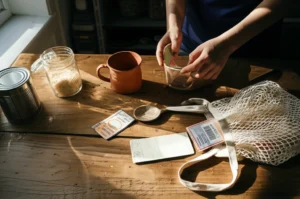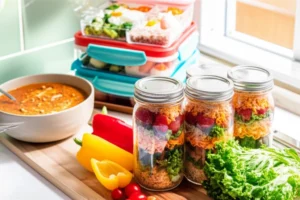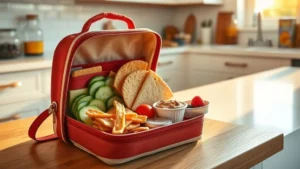Hey, can we talk about that little habit that sneaks up on all of us? You know—the one where you think, “Oh, it’s just a quick coffee,” or “I’ll grab a snack because why not?” and suddenly your bank account looks a little sadder than you expected. If you’ve ever asked yourself, “How do I stop spending money on unnecessary things?” you’re definitely not alone. I’ve been there too, and honestly, it’s not about starving yourself or going full-on Scrooge. It’s about being smart, kind to your wallet, and still living a life you love.
So, grab your favorite mug (homemade coffee, hopefully?), and let’s have a real, friendly chat about spotting those money leaks, mastering meal planning, crushing snack spending, and building habits that actually stick—without making you feel like you’re living on cardboard.
Spot Sneaky Traps
Have you ever opened your fridge, saw all the food there… but still ended up ordering takeout? Yeah, me too. Turns out, it’s not just laziness or hunger driving those extra spends—it’s sneaky triggers messing with your wallet without you even realizing it.
What Sets You Off?
Stress? Boredom? That little itch when a sale pops up? These are classic culprits behind impulse buys, especially when it comes to food. One Reddit user shared how she started tracking every snack, coffee, or “treat” she bought impulsively. The result? Eye-opening. She saw exactly when and why she spent money she didn’t really want to.
Try it yourself—jot down your buys for a week. You might be surprised by how often spending happens just because you’re scrolling your phone or stressed out. It really helps to figure out why we spend before trying to stop.
Common Traps and Tricks
| Trap | Example | Quick Fix |
|---|---|---|
| Emotional Shopping | Buying chips after a rough day | Pause. Try writing it out instead |
| Sale Siren Song | Snagging junk food just because it’s cheap | Ask, ‘Do I really need this?’ |
| Convenience Cravings | Ordering takeout because cooking feels hard | Prep easy meals ahead; check Spending too much on food for more tips |
Master Meal Planning
Okay, hear me out… meal planning doesn’t have to be a chore or mean eating like a rabbit. It’s really about a little foresight to save a bunch—and I promise it’s not painful.
Why Does This Save Money?
When you don’t plan, “what’s for dinner?” panic sets in. That panic is a monster that feeds on delivery apps and drive-thrus. But when you have a plan? You shop smart, use what you’ve got, and end up buying less junk that goes bad.
A buddy of mine once organized meals based on leftovers and on-sale ingredients. She saved almost 30% on groceries, and bonus—no more wasted food. If you’re wondering what can you do to protect the quality of the foods you buy when you get home?, protecting your produce and storing it right actually stretches your dollars even more.
Easy Steps to Get Started
Start small—plan three meals for the week, make your shopping list from that, then stick to it. Trust me, buy only what’s on your list and give the 48-hour rule a try: wait two days before buying anything unplanned. If you still want it, then maybe it’s worth it.
Simple Weekly Meal Examples
- Breakfast: Overnight oats or eggs—way cheaper than grabbing bagels on the go.
- Lunch: Mason jar salads or wraps made with bulk veggies.
- Dinner: Sheet-pan meals that use a batch of veggies and proteins for easy clean-up.
Crush Snack Spending
Snacks can be the sneakiest little budget busters. You might think, “It’s just a $2 bag,” but those bags add up. (Like, $60 a month type of add up.)
Are Your Snacks Sneaking Away Your Savings?
Some of us—I’m raising my hand here—love a vending machine visit or that quick treat during work breaks. One writer from The Everygirl gave up her daily coffee and noticed how her snack spending dropped, too. She saved a ton quickly and felt way better about her money.
If you feel the urge to grab snacks a lot, try the tactics shared in How to stop spending money on snacks. Trust me, replacing impulse buys with homemade options can be game-changing. And if you’re fed up with the costs, you’re not alone—check out I hate spending money on food for some heartfelt takes and hacks.
Snack Spending Showdown
| Impulse Buy | Cost | Frugal Alternative | Monthly Savings |
|---|---|---|---|
| Gas station chips | $2.50 | Homemade popcorn | $10 |
| Vending soda | $1.50 | Infused water | $45 |
| Delivery candy | $5.00 | Bulk nuts portioned out | $20 |
Build Habits That Stick
Alright, now that we’ve talked about spotting your triggers and hacking your meals and snacks, how do you keep it all going without burning out?
Use Your Goals as Your North Star
Setting clear goals turns “no” into “not right now.” Whether it’s saving for a trip or an emergency fund, seeing that goal can be way more motivating than just saying “don’t spend.” The 50-30-20 budgeting rule is a great way to keep wants in check while still enjoying life. It breaks down your money into 50% needs, 30% wants, and 20% savings, so you’re not feeling deprived.
Accountability Makes a Difference
Tell a friend, use an app, or even freeze your credit card in a block of ice—something Reddit users swear by to stall impulsive buys. Cutting off temptation helps keep you in control. Pair this with a cash-only envelope for groceries if you want to feel every dollar leave your hands—trust me, it works magic.
Little Wins Add Up
- Tracking every purchase, even small snacks.
- Planning meals just a little bit ahead.
- Pausing 24-48 hours before any non-essentials.
- Having a concrete goal to remind yourself why you’re saving.
And if salads and snacks still feel like a mystery, dig into I hate spending money on food and what can you do to protect the quality of the foods you buy when you get home? for tips to make your efforts all the more worth it.
One Small Thing Today
So here’s the deal: how to stop spending money on unnecessary things isn’t about quitting everything fun or suddenly hating your favorite snacks or grocery staples. It’s about being aware, making a few small changes, and building a system that helps your money work for you—not the other way around.
What’s one thing you can try starting today? Maybe it’s writing down every snack purchase for the next three days, or maybe it’s making a meal plan for the rest of the week. Whatever it is, I’m rooting for you because this stuff works when you stick to it a little at a time.
Keep it soft, keep it real, and remember: even tiny victories are wins. And if you want to geek out on food budgets and killing those unwanted spends, definitely peek into Spending too much on food and How to stop spending money on snacks. Your future self will high-five you for it.













